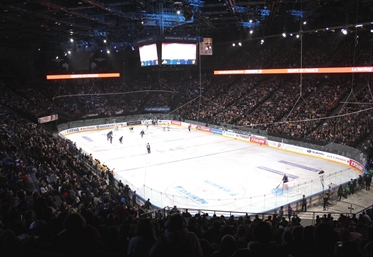Back in Bercy
Back in Bercy
World Championship arena reopens for hockey

 The Palais Omnisport de Paris-Bercy during the French Cup Final 2016. Photo: Andy Potts
The Palais Omnisport de Paris-Bercy during the French Cup Final 2016. Photo: Andy Potts
The large venue, which has hosted the Cup final for several years, was largely refurbished to serve as co-host of the 2017 IIHF Ice Hockey World Championship together with Cologne, Germany.
The Rouen Dragons took the prize in front of more than 10,000 fans, edging Grenoble’s Bruleurs de Loups 4-2 on a Jason Krog goal in the 57th minute to claim its sixth national cup and retain the trophy it won last year when the final was held in Marseille due to the work in Paris-Bercy.
Meanwhile, off the ice, the 2017 Organising Committee launched the recruitment drive for volunteers at next year’s tournament under the slogan ‘Ensemble pour 2017’ (Together for 2017) and the new-look arena passed its first big test before dropping the puck on the world stage.
The venue got the thumbs-up from those involved: Krog, a one-time Stanley Cup finalist with Anaheim, described the arena as “beautiful” and added that the ice played better than expected on its first outing. Grenoble coach Edo Terglav, who twice lifted the cup at the old Bercy said that his return to the new, high-class arena sent a shiver down his spine.
Martine Nemecek, Director of Operations for the Paris leg of the 2017 tournament, described Sunday as “a very significant date”, but is still anticipating a busy 18 months or so preparing and staging the event.
“The rebuild is now done so we are getting a good idea of how the arena will look to the public,” she said. “We’re already hearing from our guests in the function rooms that they are quite impressed with the quality of the arena. I think we are lucky to have a facility as good as this one for the second venue.
“The configuration we have today isn’t quite the same as what we’ll have in 2017. For example, we’ll need to have eight permanent locker rooms for the teams, which isn’t the case right now. The design isn’t quite the same and the ice will definitely be different. It will also be different outside when we open up a fan park.”
That ice will also get a facelift, notwithstanding Krog’s positive report. Nemecek explained that the ice crew is still being put together and the upcoming World Championship warm-up against Denmark on 17 April will be the next key milestone in the preparations for 2017.
Following November’s terrorist attacks in Paris, security concerns are an unfortunate reality for the organising committee. In response to the heightened alert ordered by the French government, every one of the 10,000 fans entering the arena on Sunday had to be searched. However, the queues outside the arena moved swiftly and the security procedures were carried out with as little disruption as possible, something that Nemecek hopes can improve still further in the coming months.
“Even before November the level of security in France was high and today we are at the highest possible level of security,” she said. “But this arena has already hosted concerts with sell-out crowds, so we know that we will be able to cope. It is working efficiently now and there will be several more events before 2017 to help improve the process.”
Before the World Championship arrives, 2016 marks the 10th anniversary of the French Ice Hockey Federation (FFHG), which formed an independent association in April 2006. In that decade the country has consolidated its place in the top division of the IIHF Ice Hockey World Championship, strengthened its domestic championship and started to export its top players to the big leagues in Europe and North America.
Not surprisingly Luc Tardif, president of the French Ice Hockey Federation and an IIHF Council member, is excited about what has been achieved and what further progress awaits.
“We have a really competitive championship this season so we’re getting good crowds almost everywhere,” he said. “The level of play is improving, our youth development is coming on and we’ve been in the top division [of the World Championship] for nearly 10 years. That’s really important because it allows our young players to dream.”
Along the way there have been some watershed moments – most notably beating Russia in Helsinki in 2013 to record France’s first win against the Russians/Soviets in World Championship play. That was followed by victory over Canada in Minsk the following year as Les Bleus reached the quarter-finals and French hockey revelled in new opportunities.
“When I talk to young kids they see things are possible,” Tardif added. “I remember when we first played in the World Championship. We used to look at the schedule and pick out the game we had to win [to avoid relegation]. All the others, like Canada, we could only try to keep the score down.
“Now things are changing. When we beat Russia we believed it was possible to beat anyone. Then the year after it was Canada. Now we can look at the schedule without any inferiority complex. It was a big leap forward. Our players have a new view of the competition. They’re coming with a different mentality. We can win games.”
The next step is pushing hockey up France’s congested sporting agenda. In a land where football and rugby are the big team sports, and where legendary events like cycling’s Tour de France, horse racing’s Prix de l’Arc de Triomphe and motorsport’s 24 Heures du Mans enjoy iconic status, co-hosting the world’s biggest annual winter sports event could be a game-changer.
“We hope that after we stage 2017 people will see hockey differently,” Tardif said. “Our league used to be in a few regions with a real hockey culture, like in the Alps, but now the big cities are joining. Bordeaux came up this year and they are getting 3,500 people to their games. We’ve got a team in Lyon as well. We are still a long way from football and rugby, but we are doing really well in our traditional areas and we need to get into the big cities. That’s what rugby did: it used to be a south-west thing, but now there’s two teams in Paris. We need that national reach. We need a big team in our capital city, and that’s on the way.”
That’s why it was important to save the practice rink at Bercy, initially due to be removed during the recent refurbishment. It’s also why two new rinks are planned alongside the federation’s new HQ, close to Charles de Gaulle airport.
“I hope that now we can start to reach national sponsorship; in our domestic league the sponsors are mostly regional,” Tardif said. “But soon Paris will be involved in staging 14 days of world-class hockey. After that fortnight, I hope things will be very different for us.”
Back to Overview
































































































